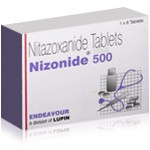Giardiasis: Key Insights and Answers to Common Questions


Giardiasis is an intestinal infection caused by the protozoan parasite Giardia lamblia. This microscopic organism is a common cause of diarrheal illness worldwide and is particularly prevalent in regions with poor sanitation and contaminated water sources. Although giardiasis is not typically life-threatening, it can lead to significant discomfort and complications if left untreated. Understanding its symptoms, treatment options, dietary recommendations, and the role of medications such as Nizonide can help in effectively managing and preventing the condition.
Causes and Transmission of Giardiasis
Giardiasis is primarily spread through the ingestion of Giardia cysts, which are the dormant, resilient form of the parasite. These cysts are excreted in the feces of infected individuals or animals and can contaminate water, food, and surfaces. The most common sources of infection include drinking untreated or inadequately treated water, consuming contaminated food, and having close contact with infected individuals or animals.
Certain populations are at a higher risk of contracting giardiasis. These include travelers to endemic areas, individuals who consume unfiltered or untreated water from lakes and streams, young children in daycare settings, and people with compromised immune systems. The parasite can survive for extended periods outside the human body, making it highly transmissible in environments with poor hygiene practices.
Symptoms of Giardiasis
Giardiasis can manifest with a range of gastrointestinal symptoms that may vary in severity. While some individuals remain asymptomatic carriers, others develop acute or chronic digestive disturbances. Among the most common symptoms of Giardia infection are:
- Diarrhea: This is often watery, foul-smelling, and persistent, sometimes leading to dehydration if untreated.
- Abdominal cramps and bloating: Many affected individuals experience significant discomfort due to intestinal inflammation and gas production.
- Nausea and fatigue: A general sense of malaise, along with nausea, can make it difficult for individuals to maintain regular eating habits.
Other associated symptoms may include weight loss, excessive gas, and greasy, foul-smelling stools that indicate malabsorption. In chronic cases, giardiasis may lead to nutritional deficiencies due to prolonged impairment of the digestive process.
Can Giardia Go Away on Its Own?
One of the most common concerns among individuals diagnosed with giardiasis is whether the infection will resolve on its own. In some cases, particularly in healthy adults with strong immune systems, mild infections may clear without medical intervention. However, the persistence of symptoms for more than two weeks often necessitates treatment to prevent complications such as dehydration and chronic malabsorption.
Even if symptoms subside without treatment, individuals may still harbor the parasite in their intestines and continue to shed cysts, contributing to further transmission. Therefore, seeking medical attention for persistent symptoms is advisable to ensure complete eradication of the infection and prevent potential long-term gastrointestinal issues.
Dietary Recommendations for Individuals with Giardiasis
During the course of giardiasis, the intestinal lining becomes inflamed and irritated, making it crucial to follow a diet that minimizes digestive distress while promoting recovery. Affected individuals should focus on consuming easily digestible foods and avoiding substances that can exacerbate symptoms.
Bland, low-fat foods such as rice, bananas, applesauce, and toast (often referred to as the BRAT diet) can be helpful in managing diarrhea. Probiotic-rich foods, including yogurt with active cultures, may aid in restoring gut flora disrupted by the infection. Hydration is also key, as persistent diarrhea can lead to dehydration; therefore, drinking sufficient water, electrolyte solutions, and herbal teas is recommended.
Conversely, individuals should avoid foods that can worsen gastrointestinal symptoms, such as dairy products (due to temporary lactose intolerance caused by the infection), high-fat foods, caffeine, alcohol, and highly processed or spicy foods. Maintaining a balanced diet and incorporating fiber-rich fruits and vegetables in moderation can also support gut health during the recovery process.
Duration and Treatment of Giardiasis
The duration of giardiasis varies depending on factors such as the individual's immune response and the effectiveness of treatment. Without intervention, symptoms can persist for weeks or even months, particularly in individuals with weakened immune systems.
Once diagnosed, giardiasis is typically treated with antiparasitic medications. The most commonly prescribed drugs include metronidazole, tinidazole, and nitazoxanide. These medications work by targeting the Giardia parasites and eliminating them from the intestines. Treatment duration ranges from a single dose (in the case of tinidazole) to several days of therapy (as with metronidazole and nitazoxanide).
Nitazoxanide, marketed under the brand name Nizonide, has gained attention for its efficacy in treating giardiasis. This medication is a broad-spectrum antiparasitic agent that disrupts the parasite's metabolism, leading to its eradication. Nizonide is particularly effective because it has a shorter treatment course compared to other medications and is well-tolerated by most individuals, including children. Unlike metronidazole, which can cause nausea and a metallic taste, nitazoxanide is generally associated with fewer adverse effects, making it a preferred option for many patients.
The Role of Nizonide in Giardiasis Treatment
Nizonide (nitazoxanide) is a potent antiprotozoal drug that has been widely used in the treatment of Giardia infections. It functions by interfering with the anaerobic metabolism of the parasite, thereby inhibiting its ability to survive and reproduce in the intestines.
One of the key advantages of Nizonide over traditional treatments like metronidazole is its shorter and more convenient dosing regimen. While metronidazole treatment typically lasts five to seven days, nitazoxanide is administered for only three days, reducing the risk of non-compliance and improving treatment outcomes. Additionally, it is effective against other gastrointestinal infections, making it a valuable option for patients with mixed parasitic infections.
Nizonide is generally well-tolerated, with minimal side effects. Some individuals may experience mild gastrointestinal discomfort, headache, or dizziness, but these symptoms are typically short-lived. Because of its favorable safety profile, nitazoxanide is considered a suitable choice for both adults and children diagnosed with giardiasis.
Prevention Strategies
Preventing giardiasis involves adopting proper hygiene and sanitation measures to minimize exposure to the parasite. Drinking only treated or boiled water, practicing good hand hygiene, and avoiding the consumption of raw or improperly washed food can significantly reduce the risk of infection. Travelers to endemic regions should be particularly cautious and opt for bottled or purified water to prevent waterborne transmission.For individuals in close-contact settings, such as daycare centers or shared living spaces, regular handwashing and proper food handling practices can help curb the spread of the parasite. Additionally, those recovering from giardiasis should maintain strict personal hygiene to prevent reinfection or transmission to others.ConclusionGiardiasis is a common yet manageable parasitic infection that primarily affects the gastrointestinal system. While mild cases may resolve on their own, treatment is often necessary to prevent complications and ensure complete recovery. Recognizing the symptoms, adopting a supportive diet, and following prescribed medications such as Nizonide can help individuals effectively combat the infection. By practicing preventive measures and maintaining good hygiene, the risk of contracting or spreading giardiasis can be significantly reduced. For those experiencing persistent symptoms, seeking medical advice remains the best course of action to ensure timely diagnosis and treatment.
Medically Reviewed by Dr. Mevan Nandaka Wijetunga, MD
(Updated at Mar 18 / 2025)

